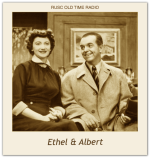
Ethel And Albert
Radio historian Gerald Nachman (in Raised on Radio) called the show "insightful and realistic... a real leap forward in domestic comedy--a lighthearted, clever, well-observed, daily 15-minute show about the amiable travails of a recognizable suburban couple" which combined "the domestic comedy of a vaudeville-based era with a keen modern sensibility. Lynch made her comic points without stooping to female stereotypes, insults, running gags, funny voices or goofy plots."
The show began as three-minute filler between a pair of Minnesota KATE station programs, then expanded to 15 minutes and finally became a half-hour show during its last years on radio. Like Easy Aces, the humor on Ethel and Albert was low-key; likeVic and Sade, it was constructed around such simple, often mundane household situations as efforts to open a pickle jar. Often Ethel or Albert would attempt to prove the other wrong over some inconsequential matter. For example, one entire script centered around Ethel disputing Albert's claim that he could see her using only his peripheral vision. "I realized that I didn't have to sit down and knock myself out every minute to try to think of something funny," Lynch told critic Leonard Maltin years later. "All I had to do was look around me."
Two film stars had a presence in the show. Richard Widmark, who portrayed Albert in 1944, left after six months and was replaced by Alan Bunce. Margaret Hamilton, famous as the Wicked Witch of the West in The Wizard of Oz, played Aunt Eva. Ethel and Albert's daughter Suzy (Madeleine Pierce), born in 1946, was the only other voice heard on the original series. [Source: Wikipedia]
|
Broadcast: December 9, 1947
Added: Dec 14 2020
|